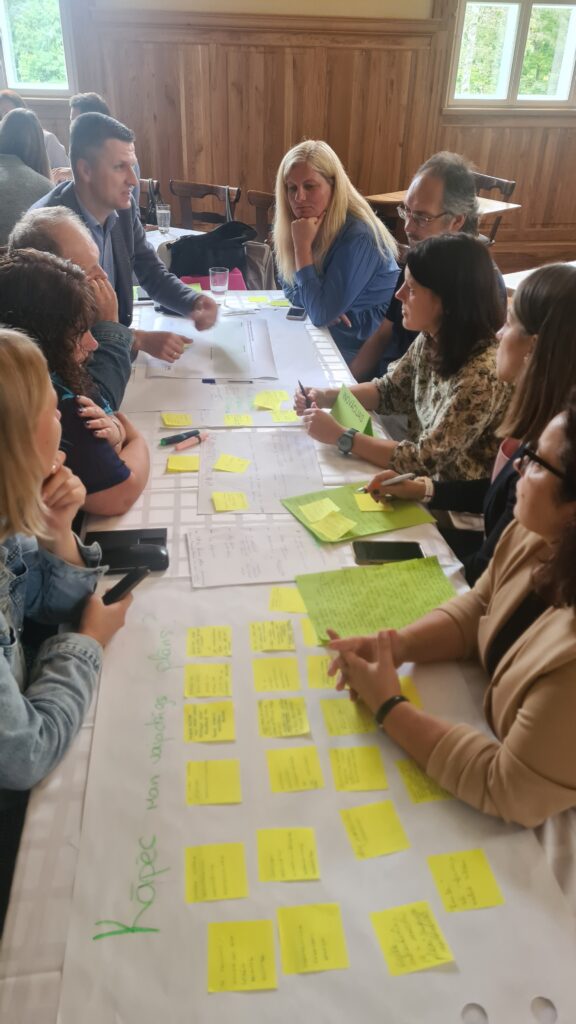The development and transformation of higher educational institutions are significantly influenced by the organisation’s strategy, its vision, mission, and strategic goals, especially in the context of partnerships, innovation, and resource allocation. Some factors highlighting the importance of a university’s strategy in its development and transformation are connected not only with the organisation’s growth, development and changing needs, but also with sustainability and social responsibility, globalisation, international partnerships and a strong reputation.
 A well-defined organisational strategy can lead to more strategic investments in educational and research initiatives, may provide grants, sponsorships, or research funding, and should align with the institution’s goals to secure these resources effectively. A well-prepared strategy should identify areas of research that align with the interests and needs of relevant companies. We can’t forget that all higher education institutions are at the forefront of rapid innovation and technological development. A university’s strategy can incorporate plans for technology transfer and commercialisation of research outputs. This can lead to the creation of startups, patents, and licensing agreements, fostering economic development, and furthering the university’s reputation, so innovation and the technology transfer- component are very important in the university’s vision. Of course, the focus of the university’s strategy should be on students – therefore, the emphasis on the quality of education, modern education methods, and the professional development of teachers is essential and important.
A well-defined organisational strategy can lead to more strategic investments in educational and research initiatives, may provide grants, sponsorships, or research funding, and should align with the institution’s goals to secure these resources effectively. A well-prepared strategy should identify areas of research that align with the interests and needs of relevant companies. We can’t forget that all higher education institutions are at the forefront of rapid innovation and technological development. A university’s strategy can incorporate plans for technology transfer and commercialisation of research outputs. This can lead to the creation of startups, patents, and licensing agreements, fostering economic development, and furthering the university’s reputation, so innovation and the technology transfer- component are very important in the university’s vision. Of course, the focus of the university’s strategy should be on students – therefore, the emphasis on the quality of education, modern education methods, and the professional development of teachers is essential and important.
Vidzeme University of Applied Sciences has been working on the creation of a new organisational strategy for a year, and the formation of the new strategy of Vidzeme University has been influenced not only by the fact that the previous strategy has ended but also by the internal and external mature need to change and transform various processes of the university.
The creation of the strategy takes place in several stages, and activities including the project “Accelerate Future HEI” which provides a good symbiosis in the creation of a strategy of our university.
In the first stage, employees of different university professional groups (teachers, managers, scientists) were involved in the ideation process about the strategy- small working groups established by the university worked throughout the year on the vision of the university’s new strategy, on a mission and values in the following areas – science, education, innovation, digitization and infrastructure. Secondly, focus group activity (supported by Accelerate Future HEI) brought together both internal, across different parts of the HEI, and external stakeholders to discuss and collaboratively envisage the desired future state and goals for institutional transformation, as well as talk about our ambition to become a more entrepreneurial and innovative university. Participants discussed topics such as the university’s role within the ecosystem, the enhanced role of external and internal support mechanisms and structures, entrepreneurship and innovation commitment, leadership, and many other important questions.
At the end of August, a joint work seminar of all university employees was held, in which employees of all university levels worked in groups on the most important strategic areas raised in the previous work stages, in which the university wants to accelerate transformation:
- Excellence and cooperation in research
- Lifelong education
- Promotion of innovations for the national economy
- The potential of digital transformation
- Quality infrastructure/real estate
Some of the outcomes and conclusions from the employees were:
- The values included in the university’s strategy must also be discussed and included in our daily work.
- Creativity, cooperation, entrepreneurship, respect and responsibility, sustainability, and academic freedom. Employees can help ensure that the university’s vision and strategy align with its core values and culture. This alignment is crucial for maintaining consistency and integrity throughout the university.
- The development of the university goes hand in hand with the development of personnel, the creation of a lifelong learning offer, the creation of a student attraction strategy, the creation of modern teaching methods, etc.
- EUDRES’s partnership allows us to see different development models of higher education institutions and it is necessary to continue gaining valuable experience.
- The development of innovations in the university is closely related to digitalization, commercialisation, and valorisation of products, as well as a common understanding of the inevitability of innovations, technology transfer, thus raising capacity at different levels of the university.
The project “Accelerate Future HEI” was also presented, and its investment was discussed at this workshop. This workshop showed that involving employees in the creation of an organisation’s vision and strategy ensures that the organisation remains agile, competitive, and aligned with its core values and staff needs.
Involving employees in creating a company’s vision and strategy is important for several other reasons. It could bring diverse perspectives and insights, as well as promote a wide range of ideas and viewpoints, which can lead to more innovative and effective strategies. Employees are more likely to be committed to the goals and objectives set forth because they had a hand in defining them. It can lead to improved employee motivation, engagement, and overall well-being in the organisation, because they understand how their individual contributions align with the company’s broader goals, which can boost morale and job satisfaction. Involving employees can lead to better decision-making. They have firsthand knowledge of the day-to-day operations and students’ interactions, which can inform strategic choices that are more practical and effective. Participating in strategy-making is also an employee’s personal development process- it can help them develop new skills and gain a broader understanding of different processes of university management. Engaging employees in creating the company’s vision and strategy can contribute to long-term sustainability. It fosters a culture of continuous improvement and adaptability, which is essential for an organisation’s survival in a dynamic business landscape.
